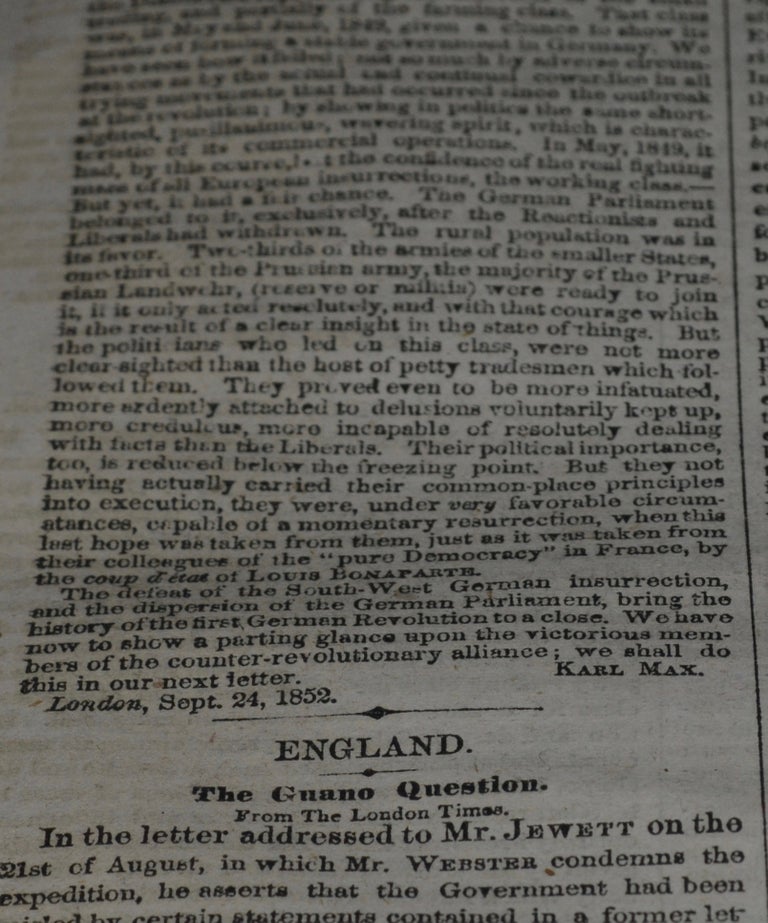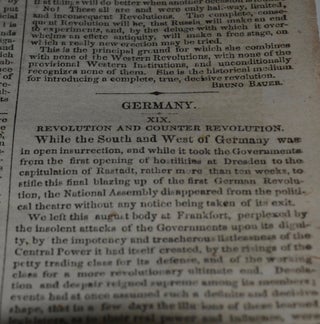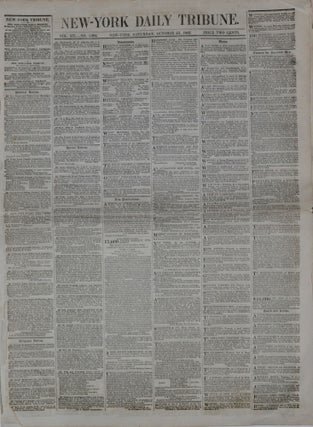Revolution and Counterrevolution in Germany. (XIX) In: New-York Daily Tribune. Vol. XII. No. 3594. Saturday, October 23, 1852.
[New York]: [Greeley & McElrath], 1852. First edition. With the article Revolution and Counter-Revolution in Germany on pp. 7–8. 12 p. First edition. With the article Revolution and Counter-Revolution in Germany on pp. 7–8. Folded once. First sheet torn at spine. A few leaves with small tears at foldings. A tiny loss to a few letters with no effect on legibility on p. 7. Paper discolored. Chipped at edges.
The ultimate article of the series of Revolution and Counter-Revolution in Germany, written by Engels and published under the byline of Marx.
Revolution and Counter-Revolution in Germany was written after Charles Dana, the managing editor of the powerful, progressive, Republican newspaper, the New-York Daily Tribune approached Karl Marx, early in 1851, with the idea that he should contribute topical and historical writings to the newspaper. Dana and Marx met first in Germany some three years before, when Dana reported the American press about the revolutionary movements in Europe.
Marx, being engaged in economic research, was unable to fulfill the commission, thus he asked his friend and co-thinker Friedrich Engels on August 14, 1851, to write "a series of articles about Germany, from 1848 onwards”. (MECW p. 629) “Engels agreed, and in the course of thirteen months he wrote 19 articles about the German revolution of 1848–49. […] Engels used as the main source of reference a file of the Neue Rheinische Zeitung, apart from some additional material given him by Marx, whom he constantly consulted and who read every article before mailing it.” (MECW p. 629)
In these articles, Engels examines the economic basis and social development of Germany at the time of the Revolution, shows that the uprising was defeated because of the liberal bourgeoisie, and concludes that bold and resolute action is essential for the victory of a revolution. (MECW pp. xiv–xv) His “work lays down basic principles of Marxist teaching on armed insurrection. Engels formulates for the first time the idea that »insurrection is an art quite as much as war«”. (MECW p. xv)
The series was printed in the Tribune between October 25, 1851, and October 23, 1852, over the signature of Karl Marx, the paper's official London-based correspondent.
Until the correspondence between Marx and Engels was published in 1913 Revolution and Counter-Revolution in Germany was regarded as Marx’s text. Its first separate edition was prepared by Eleanor Marx-Aveling, Marx’s daughter, in 1896, and in the same year a German translation was also published. While in the Tribune the articles were printed under a general title and numbered in Roman figures, in the book the articles are titled, the present, nineteenth piece bears the title The Close of the Insurrection.
Bibl.: [Marx/Engels Collected Works Vol 11.] The Collected Works of Karl Marx and Friedrich Engels. The Collected Works of Karl Marx and Frederick Engels. Volume 11. Marx and Engels 1851–1853.
.
Price: €3,000.00



